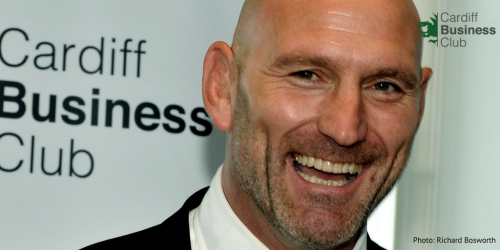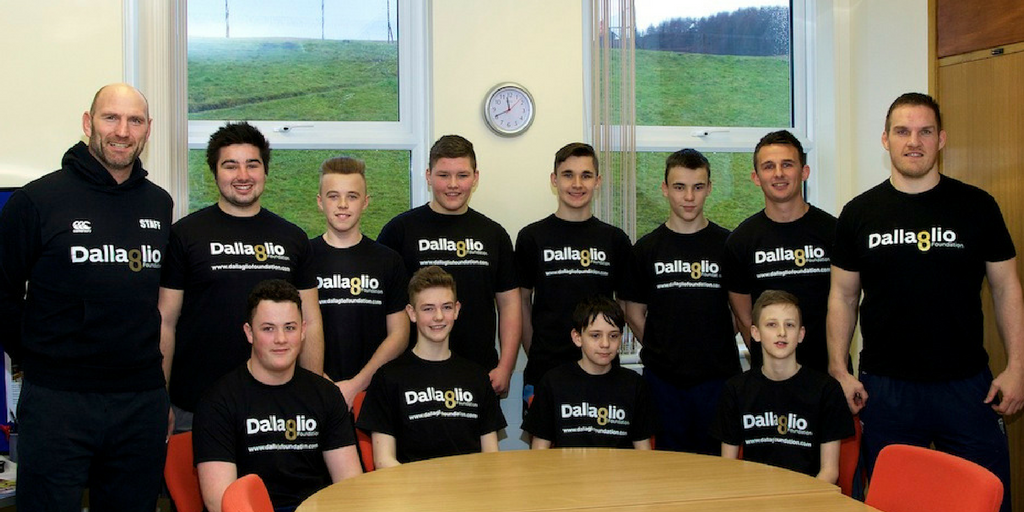News
Cardiff Business Club meets….Lawrence Dallaglio OBE
Date Posted: 21 July 2017
The annual Chairman’s Summer Reception, held at St David’s Hotel in July, saw us welcome England rugby legend and Founder of Dallaglio RugbyWorks, Lawrence Dallaglio.
Ahead of his address to the Club, Lawrence very kindly took time out to speak to us about the charity he set up and the challenge facing young people here in Wales.
Lawrence Dallaglio (LD) was interviewed for and on behalf of Cardiff Business Club by Paul MacKenzie-Cummins (PMC), managing director at ClearlyPR.
(PMC) How does it feel to be an English man back in the heartland of Welsh rugby?
(LD) I have some very happy memories of the time I spent here in Wales, with some great battles over the years for both club and country. But when the final whistle is over, there’s friendship and respect and that’s what it’s all about.
What I always saw and felt whenever I came to play here was the pride and the passion the people have for their rugby and for one another – it’s an embodiment of the people themselves.
(PMC) What prompted you to set up RugbyWorks, what is the vision for the charity?
(LD) I set it up to try and give something back, and to focus on the things that I am passionate about which can make a real difference to the lives of young people. I firmly believe that everyone deserves a good start in life.
Rugby came into my life at a time when I really needed it – it provided me with a family and support network to give me the confidence to move forward at a moment when I was going through a difficult spell.
This is where RugbyWorks really does help – it builds confidence, provides a focus and arms them with the skills they need to move forward with their lives.
(PMC) At what stage of a young persons life does the charity become involved?
(LD) We work with 14-17 year old boys and girls who for whatever reason have fallen outside of mainstream education, often excluded permanently, and end up in Alternative Provision education. As a result, they don’t necessarily get the support and care to help them move forward.
Rugby is the hook and we employ full-time coaches who go into various schools for a few hours each week to work with these young people. This is built into the curriculum and it starts by having some fun – getting everyone involved.
It is a skills and development-based programme that encourages young people to think differently about themselves, with the aim of getting them into sustained, full-time education, training or employment through a three-stage journey:
- Engagement - minimising the impact of their past
- Integration - making better decisions in the present, and
- Achievement – planning to ensure a long-term successful future
(PMC) The young people you support are coming to you at a time when they find themselves disenfranchised from the mainstream. Does this make them resistant to new ideas and how do you get them on board with what you are trying to achieve in the first place?
(LD) No one is born bad, but a combination of circumstances that sometimes include abuse, whether physical or alcohol or drug-related, sees them become excluded from the mainstream.
When I hear some of the reasons why they were excluded from mainstream education, we have to acknowledge that while they may have made a mistake there are often reasons underlying this and - they should not be given the opportunity to rehabilitate themselves…adults makes mistakes too.
Just because the education system has given up on them shouldn’t mean that society should do too, especially when you consider that an estimated 80% of young people who are excluded from mainstream education find themselves entering the prison system.
Something needs to be done to reverse that and sport – in particular rugby – has the ability to capture people’s imagination: teamwork, respect, sportsmanship and discipline are the key values that rugby teaches.
It is about having fun as much as it is about helping young people think differently about how they can channel they energies in a way that can benefit them over the long term – sometimes you just need a spark to ignite the flame that helps them to think a little bit differently about the direction they are moving.

(PMC) South Wales is one of the key areas that you work in, what are the main challenges that young people and employers in this region face?
(LD) The gap between mainstream education and alternative provision is getting worse and worse, particularly around careers advice, and RugbyWorks is an opportunity to plug that gap and help to change the way young people think about themselves and how they can create a better future in employment.
Apprenticeships have been shown to be a natural learning environment and our partners such as Halfords like the young people we work with because they can see they are trying to move out of whatever cycle they are in.
Some of the biggest issues that young people in South Wales face is that they are often second or third-generation unemployed, illiteracy is still an issue and many young people simply do not know what to do after leaving school. This has a knock-on effect for future employers too.
Education is generally focused on driving academic achievement, yet employers repeatedly say that there is a real lack of employability skills regardless of whether someone has come from mainstream education of alternative provision. Developing those skills is a key part of our programme.
Confidence is another major factor. There are many young people who have rarely – sometimes never – left their local area, so we take them away on what we call ‘employment taster days’ where they get to go to the likes of Cardiff and London; it’s about getting them to realise that if they want to seek those opportunities that are available to them they need to have the confidence to become more socially mobile and also see the myriad of roles that exist in business.
(PMC) You have a number of high profile organisations supporting RugbyWorks, how can other businesses get involved and how do you ‘sell’ your vision to them in the first place?
(LD) Building this confidence in young people is one thing, but having the employment opportunities is another and this is where businesses in Cardiff and elsewhere can help.
But businesses should also want to support young people too – it is they and their local communities who are the beneficiaries; with more young people in employment the less reliant they are on state funding, the lower their likelihood of facing prison, the narrower the skills gap becomes and the more wealth that is generated for the local economy – helping to provide opportunities and taster day for young people simply makes good business sense.
We need to tackle youth unemployment in this area and break the cycle that has prevailed for so long in many areas in Wales.
For more information about DallaglioRugbyWorks and to see the significant impact the charity has had over the last 12 months, please go to http://www.dallagliorugbyworks.com/
